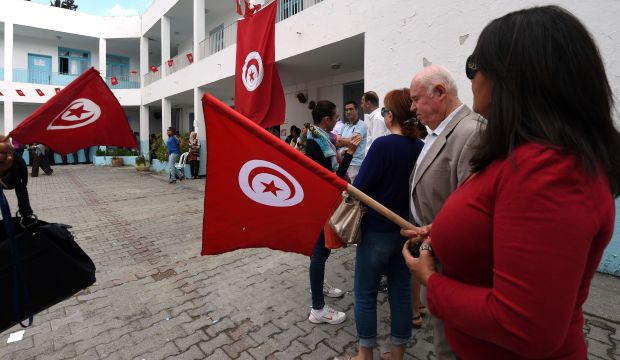Tunisia’s Islamist Ennahda Party admitted defeat in the recent parliamentary elections. It’s true that the group hasn’t lost much—it continues to hold a one-third share of the seats in parliament—but it does means that the the group has certainly failed to secure new supporters. Not only that, but other non-Islamist parties have surpassed it, and this means that Ennahda’s support base is beginning to crack.
Ennahda’s decision to accept the election results was based on expediency, and did not reflect the desires of the party’s base, judging from the reaction of the movement’s supporters in the media and on social networking websites. They took to Twitter and Facebook to launch a fierce campaign to brand the victory of Ennahda’s opponents as a prelude to the staging of a coup, the revival of the old system of dictatorship and the handover of Tunisia to a secular party close to ousted president Zine El-Abidine Ben Ali.
In contrast, a proper reading of the results of Tunisia’s election requires the use of balance, rationality, calmness, and contemplation regarding how to build on the state of confusion which has engulfed political Islam in Tunisia, the cradle of the “Arab Spring.”
Those who think carefully about the reasons Ennahda lost cannot hold some of the symbols of the previous regime responsible for the election results. It is therefore clear that this took place via a real election, not military coup as happened to Ennahda’s parent organization in Egypt.
However, a proper analysis of the results of Tunisia’s elections requires a lot more than delight that an Islamist, Brotherhood project was defeated, or the success of a party that campaigned under liberal, secular slogans (albeit ones that were marred by some contradictions).
Regional media, politicos and the general public who are seeking to analyze the Tunisian elections must not overlook two facts. The first is that the secular legacy of former president Habib Bourguiba is still deeply rooted in Tunisia’s society, intellect and legislation. The second is that Tunisia is one of the countries that has exporting the greatest number of fighters to the Islamic State of Iraq and Syria (ISIS). A recent tweet by a young Tunisian woman reflects this contradictory reality. The woman posted a map of Tunisia divided into two, one half labelled “Tunisia,” the other “Tunistan,” and called for establishing a separation barrier between the two halves.
The new Tunisia must walk a path that runs between these two sides of itself. The young woman’s blunt tweet is a warning to those who won the elections that the Tunisia that rejected Islamists in the recent election is the same Tunisia that sent many youths off to join ISIS.
A repeat of the policies of exclusion that the Brotherhood practiced will mean a repeat of the electoral defeat that Ennahda suffered. This is a punishment that Tunisia knows how to unleash against anyone seeking to wield the policy of exclusion.
The need to grow the “Bourguiba option” and adapt it to the circumstances of the present day requires the wisdom and insight that is the result of practical experience.
